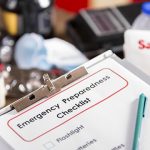
Be prepared: 3 Tips to better communicate with your family during an emergency
Saturday, October 21, 2017 by Michelle Simmons
http://www.preparedness.news/2017-10-21-be-prepared-how-to-communicate-with-your-family-during-an-emergency.html

It is important to be always prepared in times of emergency. This includes always having a plan and keeping a ready supply of survival essentials. But more importantly, you need to know how to communicate well with others during these situations. Here are three tips that will help.
Tip 1: Make use of technology
Almost everyone is on social media. You can take advantage of this to reassure your family immediately and easily. Social media platforms such as Facebook and Twitter have become great tools for disseminating information before, during, and after emergency situations, such as earthquakes, floods, and hurricanes. This was proven useful when, in 2011, Virginia was about to be hit by an earthquake. People were warned beforehand through Twitter, allowing them enough time to prepare. Many lives were saved because of this. Facebook, on the other hand, is the social media platform that most people use to keep tabs on their loved ones.
Make use of your phone to download mobile apps for emergencies, like the apps offered by the Red Cross. The organization has a series of mobile apps that were designed to teach you before an emergency and guide you after one. It offers disaster tutorials for tornadoes, hurricanes, earthquakes, and floods. Download which are applicable to your area and go to the toolkit section. The toolkit section contains everything you need to make a plan, get immediate first aid information, and notify your family and friends that you are safe. Moreover, each app has a flashlight, strobe light, and alarm that are useful in case you get trapped and need to let people know your location. The “I’m Safe” tab of the toolkit allows you to send a customized message about your situation and whereabouts on your social media accounts, text messaging, and email all at once.
Tips 2 and 3: Be smart
- Set up a phone tree – Setting up a “phone tree” is a vital part of a family communications plan. It is the old fashioned form of social media, in which one out-of-state contact ensures that everyone is contacted. Every member of the family contacts the out-of-state designated caller (now the central source of information), who then provides updates to everyone. Plan how often everyone reports back to the contact until everyone is reunited, then check-in daily for any updates. The phone tree will help you keep updated on how every member of the family is faring.
- Utilize radios during an emergency – There are several types of communication radios that you and your family can choose from. This includes cellphones, citizen band, family radio service, general mobile radio service, multiple user radio service, and amateur radio service. Select the best option that is within your family’s needs and budget. (Related: You need to know these 8 essential survival tips to prepare you for the next catastrophe.)
Planning beforehand will help ensure that all members of the family know how to contact and where to meet up in an emergency. There are three simple steps to start planning, according to the Federal Emergency Management Agency. The first step is to list down the contact details of your family and other important people and offices. Next, distribute a copy of the list to every family member. Lastly, practice. Conduct household meetings regularly to review and practice your plan.
Read more news similar to this on Survival.news.
Sources include:
Tagged Under: Tags: backup plan, communication, Disasters, emergency, family, preparedness, survival





